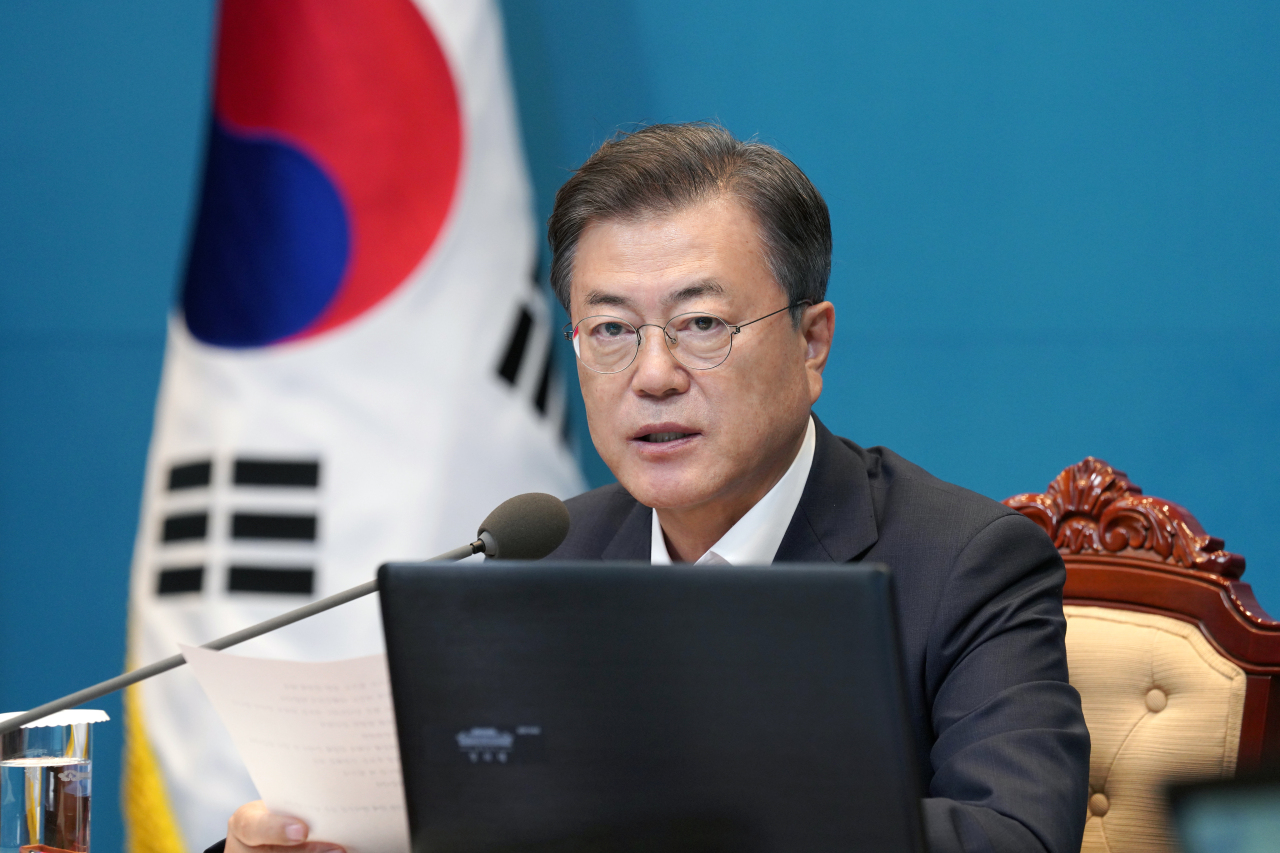 |
(Yonhap) |
President Moon Jae-in pressed the National Assembly on Monday to help the government's efforts to stabilize the property market and establish a special unit to investigate corruption among senior civil servants, as lawmakers opened a temporary parliamentary session earlier in the day.
He was referring to two of his administration's major and urgent policy tasks, speaking in front of pool reporters at the outset of his weekly meeting with senior Cheong Wa Dae aides.
"The foremost undertaking for now to help people is real estate measures," the president stressed, pointing to the "most abundant" global liquidity and lowest-ever interest rates. Housing prices have continued to surge in many parts of South Korea, in particular in Seoul and nearby cities.
Moon reaffirmed his liberal administration's resolve to curb property speculation and protect those who are in need of houses for residential purposes, especially low- and middle-income families and younger people, via tough policy measures.
"I would like the National Assembly to cooperate as well," he said, citing relevant bills, which include jacking up property ownership taxes on those with two or more houses.
He took note of the parliament's fundamental responsibility.
"I hope the National Assembly will fulfill its basic obligations in accordance with procedures set by the National Assembly itself," he added. "The legislature should not commit a mistake of disrupting the law on its own. ... I hope that the people's demand that the National Assembly operate normally won't be ignored."
Moon also pointed out that there are many things for lawmakers to decide for the launch of the non prosecution unit specializing in corruption probes of top prosecutors and other high-grade public officials. Legislation on the politically controversial initiative calls for the launch of the agency within this month, provisionally named Corruption Investigation Office for High-ranking officials (CIO).
The move is a core element of the Moon government's push for the reform of the state prosecution service accused of having excessive power and authority.
Another bout of fierce wrangling between the ruling Democratic Party and the main opposition United Future Party (UFP) is expected in the upcoming process of recommending two candidates to lead the agency. The UFP has strongly opposed the creation of the new organization, claiming it would be exploited as an organ to suppress the prosecution and conceal possible wrongdoings by Moon and his aides.
Last month, Moon sent a formal document to National Assembly Speaker Park Byeong-seug requesting the parliament pick candidates so that the government can appoint the head of the agency by July 15 as stipulated in law.
"I ask (the National Assembly) to recommend candidates and hold a confirmation hearing with no further delay," the president said.
He also emphasized the importance of speeding up the spending of stimulus budgets, approved by lawmakers last week.
The 35.1 trillion-won ($29.3 billion) supplementary budget represents the third extra funding allocated by South Korea in response to the COVID-19 crisis.
Moon said the government is joining forces with medical workers and the people to overcome the difficulties amid growing concerns about a second wave of pandemic.
"The National Assembly's role and responsibility are not small either," he said, urging it to endorse plans to bolster South Korea's disease control system.
For instance, he added, it's urgent to elevate the Korea Centers for Disease Control and Prevention (KCDC) to an independent administrative organization with power to handle its own budget and personnel matters.
Suh Hoon, the newly appointed director of national security, attended the meeting. The former National Intelligence Service chief replaced Chung Eui-yong in Moon's shake-up of his security team. The reshuffle was announced last Friday in pursuit of a breakthrough in efforts to reinvigorate Seoul-Pyongyang ties and jump-start the Korea peace process. (Yonhap)








![[Today’s K-pop] Blackpink’s Jennie, Lisa invited to Coachella as solo acts](http://res.heraldm.com/phpwas/restmb_idxmake.php?idx=644&simg=/content/image/2024/11/21/20241121050099_0.jpg)